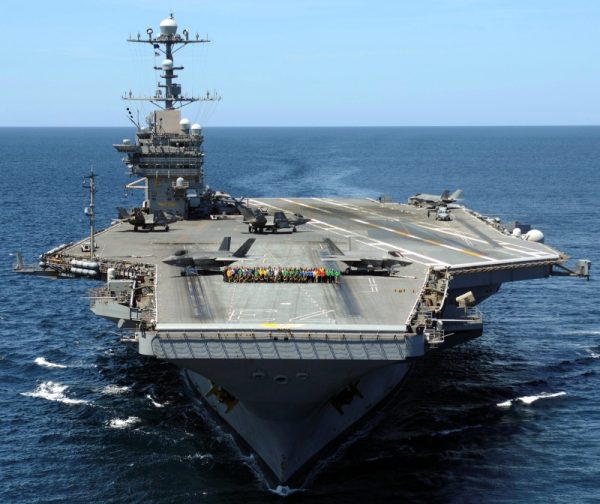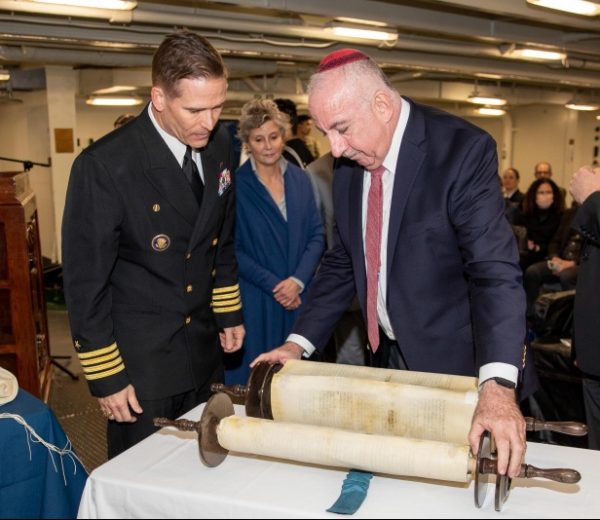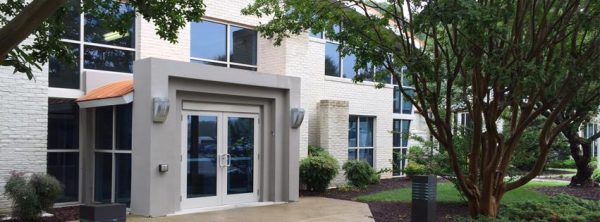V’hi She-am’dah Lavoteinu Velanu | והיא שעמדה לאבותינו
We boarded by way of the hangar deck, a cavernous facility just below the flight deck from which fighter jets and helicopters are launched into combat and a host of other missions. The USS George Washington is a Nimitz-class aircraft carrier, nearly 1,100 feet long and more than 250 feet wide. The deck measures four-and-a-half acres, and at sea it carries a crew of roughly 5,000. Originally commissioned on July 4, 1992, it is currently completing a five-year overhaul at its approximate half-life, before redeploying for another quarter century of service on the high seas.
She is the fourth United States Navy ship named for George Washington, whose August 18, 1790 letter to the Hebrew Congregation in Newport, Rhode Island, following his visit there, underscored America’s commitment to tolerance and religious liberty:
For happily the Government of the United States, which gives bigotry no sanction, to persecution no assistance requires only that they who live under its protection should demean themselves as good citizens, in giving it on all occasions their effectual support.

In the company of the ship’s senior officers, JCC Movement and Jewish community leaders from San Diego, San Francisco, Chicago, New York, and across eastern Virginia, gathered together with members of the Sillins family to dedicate an Aron haKodesh|Holy Ark and a sefer Torah|Torah scroll, both of which now are permanent fixtures of the USS George Washington’s critical infrastructure—a resource for both Jewish crewmembers and those of other faiths.
The design of the ark was fashioned after the hutch above Washington’s desk at his home in Mount Vernon and, together with a meticulously restored Torah, was made possible through the generosity of Bernard Sillins, who served in the United States Air Force during the Korean War, and that of his family. Determined to find a way to give back to the men and women serving in the armed forces today, they discovered JWB Jewish Chaplains Council®, and this dedication was a singular moment in their nearly two decades of generous support.
The ceremony took place on April 10, one day after the 105th anniversary of JWB’s founding in 1917. It was established to support the spiritual needs of young Jewish men going off to fight in World War I. In the ensuing decades, JWB’s mission evolved to include providing guidance and support to a growing network of YM-YWHAs, today’s JCCs, which number 170 across neighborhoods, towns, and cities from coast to coast; together they serve more than 1.5 million people each week, including the largest and most diverse cross section of Jews on the continent.
Throughout these years, our movement’s dedication to those who serve our country has never wavered, and today, JWB’s commitment to the roughly 10,000 Jewish active-duty service personnel and the 15,000 family members who live with them on U.S. military installations across the country and around the world are the object of that continuing commitment.

Sunday’s dedication was replete with pomp and circumstance, as well as powerful and inspirational remarks—all part of a traditional ceremony in which the Torah was passed from JCC Movement leaders to the ship’s captain, Brent Gaut, to its chaplain, Commander David Jeltema, and then on to two Jewish crewmembers who placed it inside the new ark.
But it was a conversation with Captain Gaut that began prior to the ceremony to which my thoughts return. He told me that among his greatest concerns is the mental health and emotional well-being of his crew— a product of the pandemic years and the increasingly fractured society they are pledged to defend. Commissioned as an officer upon his graduation from the U.S. Naval Academy at Annapolis in 1994, the captain has served our country with distinction for more than 25 years, including combat deployments as part of Operations Enduring Freedom and Iraqi Freedom. He said he has never seen such a level of fragility among his younger crew members, a statement made all the more profound by the news he later shared with me as we disembarked: Sadly, while the men and women of the USS George Washington are able to fight and win our nation’s battles, it is the war on mental health where the officers and crew find their greatest challenge as two of their shipmates succumbed to suicide.
I continued to reflect upon this disturbing insight as I visited two area JCCs. My first stop was the United Jewish Community of the Virginia Peninsula in Newport News, an integrated community that combines the local Jewish Federation with a JCC and Jewish Family Service, and which is also home to both Orthodox and Conservative congregations. My time there coincided with an event celebrating the service of its remarkable JCC early childhood teachers and their legendary head of school, Carmela Malkin-Kuhn.

I spent Tuesday in Richmond at the Weinstein Family JCC, a visit highlighted by meetings with both staff and the board. Once again, I had the chance to acknowledge the extraordinary service and dedication of a team of professionals who managed to shepherd an entire Jewish community through the trials and tribulations of the pandemic, as well as the societal and community strife that have marked these years.
Among the faces in each of these remarkable JCCs were young people—taking formative steps in careers in our movement and in service to the Jewish people that will touch the lives of hundreds, if not thousands, of families. Again, I was reminded of the young men and women to whom Captain Gaut referred.
Each generation knows its own challenges, its own perils, and its own unique opportunities—and I have every expectation that this new generation of young people dedicated to service will prevail over the challenges it faces today. They will look to those with greater experience, to role models, mentors, and leaders, to guide them. And they will draw upon the accumulated wisdom of the Jewish people, found throughout our sacred texts. Perhaps most meaningfully, they will find it in the sefer Torah, whose second book, Exodus, is the Passover story that will be retold in Jewish homes in every corner of the world beginning at sundown today.

The Haggadah calls upon each of us to revisit the story as if we ourselves had been taken out of bondage in Egypt by the outstretched hand of God. We’ll recount the misery of slavery, the onset of the plagues, the leadership of Moses, the pursuit by Pharoah and his soldiers, the parting of the Red Sea, the appearance of manna from heaven, and, ultimately, our arrival at the foot of Mount Sinai, where we received the Ten Commandments and the laws, the 613 mitzvot, codified ever since in the sefer Torah.
V’hi she-am’dah | והיא שעמדה—for not only one has risen up against us to destroy us, but in every generation, they rise up to destroy us. But the Holy One, Blessed be He, delivers us from their hands. These lines, typically sung during the course of the Pesach seder, are usually thought to refer to enemies of the Jewish people—enemies of Israel. But as we sing them this year, perhaps they will also refer to other challenges with which we’ve been confronted—crises in public health, in our fractured communities, and in our belief in both ourselves and the institutions that bind us together as a nation and as a people.
On Pesach we join together to delve into our history, in a continuing search for wisdom to guide our steps—the wisdom of Torah. That wisdom is now a permanent part of the USS George Washington and a perpetual wellspring of inspiration and insight to its crew—as it is to every Jewish community, wherever they are found.
May He who lifted us out of slavery continue to enable us to rise up, meet and overcome every obstacle, challenge, and adversary along the way.
Chag Kasher v’Sameach v’Shabbat shalom | חַג כָּשֵׁר וְשָׂמֵחַ וְשַׁבָּת שָׁלוֹם
Doron

President and CEO
JCC Association of North America
Reader Interactions